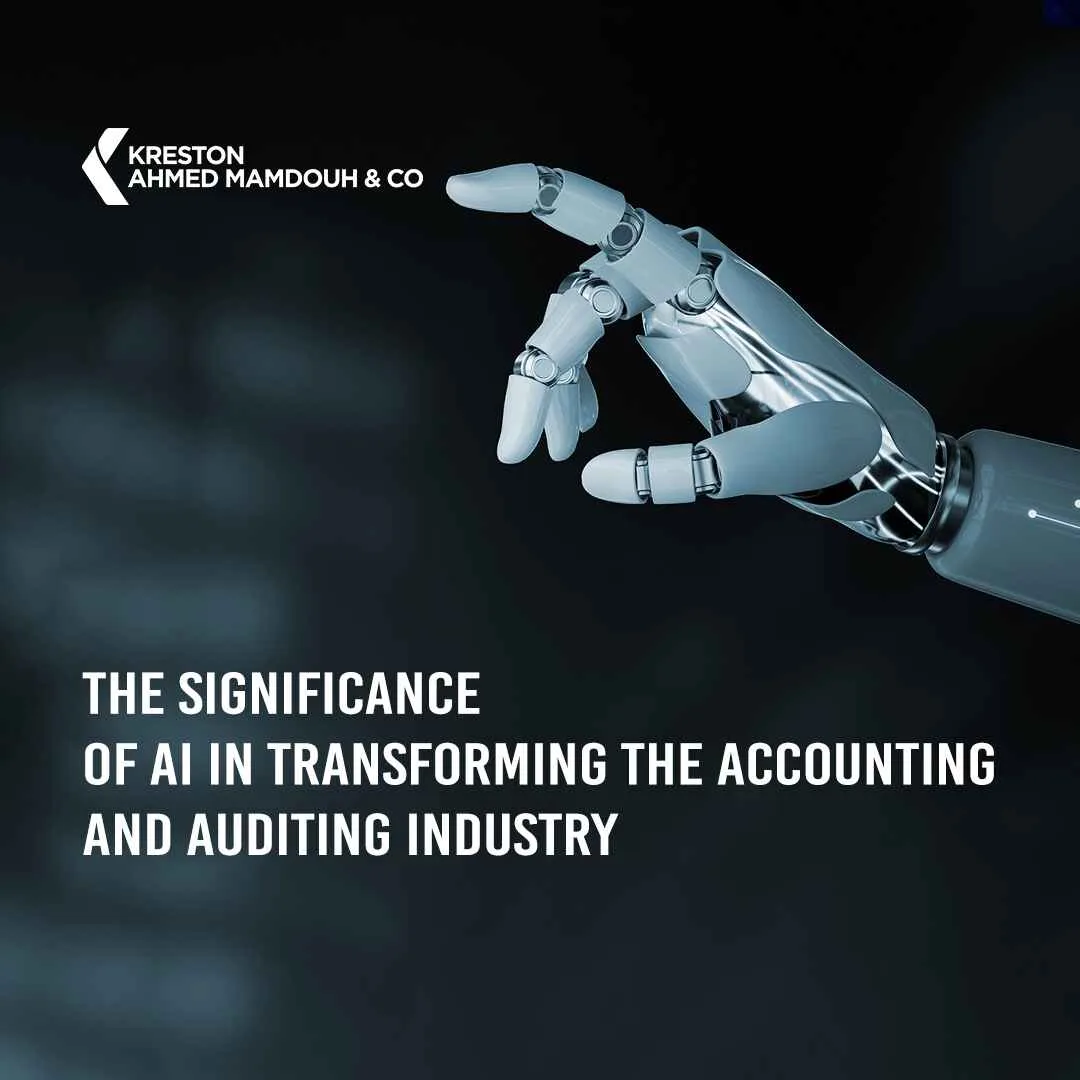Significance of AI in Transforming Accounting & Auditing Industry

Artificial Intelligence (AI) has proven to be a transformative force across diverse industries, revolutionizing businesses’ operations. In accounting and auditing, AI has brought about significant changes, automating routine tasks, enhancing risk assessment, improving data analysis, and providing valuable insights for decision-making. This article explores the significance of Artificial Intelligence in transforming the accounting and auditing industry and its transformative potential, benefits, challenges, and best practices for successful AI adoption. Additionally, we will delve into Ahmed Mamdouh & Co. Kreston Egypt’s practice in the AI revolution.
Unleashing the Power of AI in the Modern World
Artificial Intelligence refers to developing computer systems that can perform tasks that require human intelligence. It encompasses various technologies, including machine learning, natural language processing, and robotics. Artificial Intelligence has found applications in diverse industries, such as healthcare, transportation, retail, and finance. Its ability to identify patterns, analyse significant amounts of data, and make accurate predictions has made it an essential tool for businesses worldwide. The accounting and auditing industry are experiencing a paradigm shift with the integration of AI. Traditionally, finance and audit professionals have relied on manual processes and data analysis, which are time-consuming and prone to errors. AI technologies, on the other hand, offer automation, improved accuracy, and enhanced decision-making capabilities. These advancements allow accountants and auditors to prioritize higher-value tasks, like risk management and strategic planning.
How will AI transform the field of accounting and auditing?
AI plays a vital role in streamlining accounting and auditing processes. It automates repetitive tasks like data entry, reconciliations, and report generation. Machine learning algorithms can extract valuable insights from financial data, detect anomalies, and predict future trends. Natural language processing facilitates the analysis of unstructured data, such as financial reports, contracts, and regulatory documents. Robotic process automation (RPA) further enhances efficiency by executing rule-based tasks with minimal human intervention.
How can AI adoption in accounting and auditing benefit companies of different sizes?
The adoption of AI in accounting and auditing yields numerous benefits for firms and their clients:
- Enhanced Accuracy: AI systems minimize human errors in data entry and analysis, ensuring greater accuracy in financial reporting and auditing processes.
- Improved Efficiency: Automation of routine tasks such as data entry and reconciliation accelerate workflows, allowing professionals to focus on higher-value activities.
- Advanced Analytics: AI-powered analytics enable deeper insights into financial trends, risk factors, and performance metrics, facilitating informed decision-making.
- Risk Mitigation: AI algorithms can detect fraudulent activities and compliance discrepancies more effectively, reducing the risk of financial fraud and regulatory non-compliance.
- Cost Savings: By streamlining operations and optimizing resource allocation, AI adoption can lead to significant cost savings for accounting and auditing firms and their clients.
Challenges and Considerations in AI Adoption
Despite its transformative potential, AI adoption in the accounting and auditing industry presents several challenges:
- Data Quality and Integration: AI systems rely on high-quality, structured data for accurate analysis. Ensuring data integrity and compatibility across disparate sources can be a significant hurdle.
- Regulatory Compliance:Compliance with data privacy regulations and industry standards is paramount, requiring careful consideration of data handling practices and algorithm transparency.
- Skills Gap: The successful implementation of AI necessitates expertise in data science, programming, and domain-specific knowledge. Bridging the skills gap and fostering a culture of continuous learning are essential.
- Ethical Implications: AI-powered decision-making raises ethical concerns regarding bias, fairness, and accountability. Ethical guidelines and oversight mechanisms are essential to address these issues responsibly.
Insights for best practices for successful AI adoption in the accounting and auditing industry
To maximize the benefits of AI adoption while mitigating risks, accounting and auditing firms can consider the following best practices:
- Start with Clear Objectives:Define specific goals and use cases for AI implementation, aligning them with the firm’s strategic priorities and client needs.
- Invest in Data Infrastructure: Establish robust data management systems and protocols to ensure data availability, quality, and security for AI applications.
- Foster Collaboration: Encourage interdisciplinary collaboration between accounting professionals, data scientists, and IT specialists to leverage diverse expertise and perspectives.
- Prioritize Ethical AI: Develop ethical guidelines and governance frameworks to address biases, ensure transparency, and uphold ethical standards in AI-driven decision-making.
- Embrace Continuous Learning:Cultivate a culture of innovation and learning within the organization, providing employees with training and development opportunities to adapt to technological advancements effectively.
Ahmed Mamdouh & Co. Kreston Egypt’s services and its added value to corporates and SME businesses
Ahmed Mamdouh & Co. Kreston Egypt, a reputable accounting audit firm, is at the forefront of technological innovation. It leverages AI to deliver superior services and added value to businesses. Through strategic partnerships and investments in cutting-edge AI technologies, Ahmed Mamdouh & Co. Kreston Egypt enhances its financial analysis, risk assessment, and compliance management capabilities. By integrating AI-driven solutions into its audit and advisory services, Ahmed Mamdouh & Co. Kreston Egypt empowers clients to navigate complex financial landscapes, mitigate risks, and effectively seize growth opportunities.
While Ahmed Mamdouh & Co. Kreston Egypt’s specific implementations of AI practices may vary based on client needs and industry requirements, the firm remains committed to harnessing AI’s power to drive innovation, efficiency, and excellence in the accounting and auditing industry. Through continuous innovation and a client-centric approach, Ahmed Mamdouh & Co. Kreston Egypt continues to redefine standards of excellence and deliver measurable value to its clients in Egypt and beyond.
References:
- Association for Accounting and Data Analytics (AADA): https://www.acq.osd.mil/asda/ae/ada/data-analytics.html
- American Institute of CPAs (AICPA) & Artificial Intelligence: https://www.aicpa-cima.com/topic/technology/technology-greater-than-artificial-intelligence
- How AI is Transforming the Accounting Profession: https://www.forbes.com/sites/quickerbettertech/2024/01/01/the-very-emerging-role-of-ai-in-the-accounting-industry/